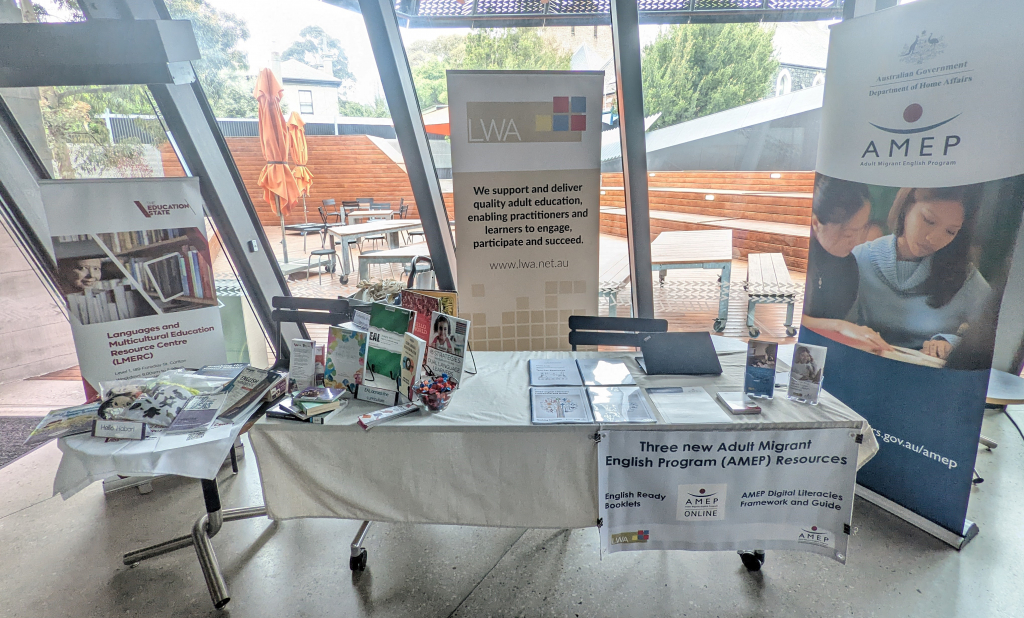Meet the Assessors Online 2024 29 February 2023, 4:30pm – 6:00pm, Online Summary In this online event, co-chief assessors Jenna Gomes and Glynis Rose, and experienced assessor Michael E Daniel...
Multilingual authors ‘standing taller’ in arts-rich translanguaging spaces
15 February 2024, 4:30pm – 5:30pm, Online
Summary
In this professional learning webinar, Dr Julie Choi and Dr Rafaela Cleeve Gerkens introduced us to some of their recent work around translanguaging in collaboration with community organisation Kids’ Own Publishing. They began with a discussion around what teachers might already do in their own classrooms to bring students’ home language into their learning. They then provided us with some practical and visual examples of a 6-week case study that involved year 4 EAL students participating in a bookmaking experience. Julie and Rafaela discussed how to foster students’ identities as resourceful multilingual writers and the importance of using arts-rich experiences. They also allowed participants to reflect on any challenges they have encountered when drawing on plurilingual strategies. The evidence highlighted how translanguaging and playful multimodal opportunities can support and lead language interactions where students can build their identities in the classroom. Thank you to both Julie and Rafaela on a very informative and useful session!
Recording
Resources
TQ article: https://onlinelibrary.wiley.com/doi/full/10.1002/tesq.3279
Kids Own Publishing: https://kidsownpublishing.org.au/
NGV at the VicTESOL AGM
Monday 4th December, 2023 from 4:30 pm – 5:30 pm, Virtual Event
Summary
Leah Santilli from the NGV took attendees of the 2023 VicTESOL AGM on a virtual tour of some the NGV’s collection. She showcased the strong relationship between VicTESOL and the NGV by talking about some of the wonderful events we have been involved in together this year. She also gave attendees the opportunity to be students, and try out some activities analysing different artworks.
Many thanks to Leah and her team for all their work putting this together, and we look forward to working with you again in the future!
Recording
Resources
Steering the Agentic Vehicle: Exploring English as an Additional language (EAL) Teachers’ Professional Agency since the 2021 Victorian EAL Curriculum Reform November 22, 2023 from 4:30 pm – 6:00 pm,...
Online LMERC Resourcing Event
September 6 from 4:00 pm – 5:00 pm – Virtual Event
Summary
Participants had the opportunity to learn about Languages and Multicultural Education Resource Centre (LMERC) and the resources and assistance available.
Recording
Resources
Resources to Come
LMERC Resourcing Event
Thursday, 11 May 2023 from 4:30pm – 6:00pm,
Languages and Multicultural Education Resource Centre (LMERC) library, Level 1, 189 Faraday Street, Carlton
This presentation was delivered by Ruth Woolven at the LMERC Resourcing and Networking Event on 11 May 2023. The library holds an extensive collection of over 25,000 resources in all formats for educators across all sectors and at all levels, early childhood to adult. At the session, the attendees were able to browse the resources, sign up for membership to borrow the resources and network with the other participants!
Using Chat GPT to support EAL teaching and planning
Introducing a new series of three videos from VicTESOL on using Chat GPT to support EAL teaching and planning. Join us as we explore how to use Chat GPT to create a range of educational materials that are tailored to the needs of EAL learners. In these videos, we will show you how to create a worksheet, a differentiated model text, and a science unit for EAL learners on the topic of climate change. Watch and learn as we demonstrate how Chat GPT can help you to provide engaging and effective learning experiences for your EAL students.
Please note the above description was generated by Chat GPT!
Using Chat GPT to create a worksheet
Using Chat GPT to create a differentiated model text
Using Chat GPT To create a unit of work
2022 VicTESOL Symposium
LWA and LMERC at the 2022 Symposium
Alfredo Landeros and Ruth Woolven
LWA
LWA were pleased to share a table with LMERC (Languages and Multicultural Education Resource Centre) at the VicTESOL Symposium on Friday 11th November 2022. It was great to showcase with LMERC resources that related to second language acquisition and language teaching methodology for all levels, from early years to adults.
The AMEP 3 new resources: the English Ready Booklets, AMEPOnline, and the Digital Literacies Framework, Guide, and companion Teaching Resources were of great interest to symposium participants and the participants are looking forward to their publication on the Australian Department of Home Affairs website (Adult Migrant English Program page).
Languages & Multicultural Education Resource Centre (LMERC)
The Symposium provided me with a wonderful opportunity to meet so many EAL educators and the sessions were very informative. Being new to LMERC, I enjoyed chatting about what we provide and what is important to you. We appreciate any suggestions/recommendations for resources.
LMERC is a specialist resource centre for educators across all sectors with both digital and physical resources to support EAL teaching and learning. This includes academic and practical teacher resources; culturally inclusive fiction and non-fiction; games and storytelling kits and realia (puppets, masks, clothes and toys).
We regularly provide bi-lingual dictionaries and picture books, readers and other resources to support your students in schools across Victoria. If you need any resources, you can visit us in Carlton, email for suggestions or look through our catalogue and request items. We have a growing collection of ebooks and audio books that you can access through the catalogue.
We send a newsletter once a term with information about our new resources, professional learning opportunities and relevant articles. Please email if you would like to receive the newsletter.
Telephone: (03) 9349 1418
Catalogue: lmerc.softlinkhosting.com.au
Opening hours: weekdays 9am-5pm, including school holidays
How to Join LMERC and select Register in the top right-hand corner

Edwin Creely, Katrina Tour, Peter Waterhouse & Elizabeth Keenan Thursday 4 November, 4-5:30pm, online Download (PDF, 919KB) During the session participants contributed to these documents in their discussions. Flipped Learning :...
Wednesday 25 August, 2021, 4-5pm
Explore Immigration Museum’s digital resources and content that can expand learning experiences for EAL learners. Museum resources include migration stories, cultural stories, and objects, timelines and personal stories investigating a myriad of Australian identities. This professional learning program was designed for EAL and classroom teachers. Resources can be adapted to suit a variety of subjects, including Humanities, English, Civics and Citizenship. Presented by Immigration Museum Educators in collaboration with VicTESOL.
Gurmeet Kaur is the Education Program Producer at Immigration Museum and is an experienced former classroom teacher of English and Humanities. She has also worked on international programs such as Teach for Bangladesh and researched intercultural education in schools across Japan, Australia, and UK. Gurmeet studied International Relations and History at the London School of Economics and Political Sciences before completing her qualifications in Education.

